Ghost Trapper 12 The Necromancer's Library Read online
Page 6
The Oglethorpe County Library was our first stop on the long road back to the late professor's mansion, a little brick building with four white columns topped by a triangular pediment.
“They really went for that ancient Greek stuff around here,” Stacey said.
“See, this is the kind of library I like,” I said, leading the way to the entrance. “Well-lit with no murderous ghosts lurking in the shadows.”
“You're just assuming that,” Stacey pointed out.
The public library was definitely pleasant and not scary at all, and more importantly, they had the local Oglethorpe Echo newspaper on microfilm going back to 1874. Dr. Marconi's recent obituary had been no trouble to find, but Piper had died decades earlier, before everything went digital.
Working for a private detective agency doesn't come with many perks—it's virtually perkless, to be honest—but I did have access to databases used by licensed investigators and law enforcement. They call it data fusion, and it's a little spooky how much they can pull together from public and semi-public records.
Soon I'd tracked down the key details about Piper's life, such as the date of her birth, marriage, and death.
Armed with that, I quickly found her obituary in the newspaper archives.
Pipette Overbrook Marconi, 26, was preceded in death by her father, Granton Overbrook. She is survived by her husband, Dr. Philip Marconi of Oglethorpe County, and her mother, Annalee Waldrum of Folkston, Georgia.
I double-checked my notes on Dr. Marconi. “Hey, Stacey?”
“Yes?” she asked from the other microfilm machine, sounding dead bored.
“Did you pick up that Dr. Marconi's wife was a few decades younger than him?”
“Didn't look that way in the painting.”
“Maybe that's why the house has paintings instead of photographs,” I said. “He didn't like the age difference being so obvious.”
“Maybe. Weirdo. So I guess we're done here—”
“I'm going to dig back, see what else I can find.”
“Ugh! Didn't you promise me a creepy old graveyard?”
“If you're bored, you can head down to the courthouse and dig out the ownership history of that house and the land it's on. Find out everything you can about its past. See if you can find any sweet, sweet notices of construction or zoning variances.”
“That is supposed to cure my boredom?”
“No, it's supposed to put you far enough away that I can't hear you complain.” I checked the time on my phone, then handed her my keys. “Seriously, though, business hours are winding down, and I can't be in two places at once. Come back before the library closes at six.”
“Fine,” Stacey said, shuffling out with all the enthusiasm of a teenager on her way to do yard work.
I kept digging.
Piper's marriage announcement to Dr. Marconi described her as a “recent graduate of the University of Georgia with a Bachelor of Fine Arts in Dance” and her new husband “a distinguished professor of history.”
There was no photograph of the happy couple. I guess the Oglethorpe Echo hadn't agreed to run a painting.
Dr. Marconi's file indicated that he'd been married before; Piper had been his second wife. His first had been named Vera.
In a 1973 newspaper, I found a public announcement for his book. Dr. Marconi, actually looking much as he did in the paintings at his home, stood in front of the metal arches at UGA's campus entrance, young and bearded and fairly handsome, his high-collared checkered suit and ascot looking very 1970s. Next to him stood a pretty young woman with long braids and bell-bottom pants, also looking very 1970s.
Associate professor Philip Marconi and wife Vera with his new book of Southern legends and folk tales.
The librarian apologetically interrupted my research and told me they were closing. Like most public libraries these days, they had to keep short hours.
I hurried outside, where Stacey was pulling into the parking lot. She waved, looking excited behind the wheel of the van, which made me wonder whether she really had spent the last couple of hours digging through property records at the courthouse.
“Guess what?” she said as I climbed into the van.
“You found a major break in the case.”
“Huh? No. Guess what that courthouse has, though?”
“The identity of the medieval ghost guy?'
“No, you're not thinking. A clock tower! Just like the other town we passed through. Marty McFly would have no trouble getting back to the future from here.”
“So this whole region could be thick with time travelers.”
“Exactly.”
“And did you get—”
“Yes, the boring property records. Some were so old and crumbly I couldn't stick them on the photocopier, but I took snapshots.”
“Great. Any surprises?”
“Well, the house was originally built by a family named Taylor, which we knew, back in the year eighteen-forty-something-that-might-be-a-three-or-an-eight. The records are pretty faded, you can check for yourself. The sons fought on the Confederate side and never returned from the war. The lone heir was a daughter, who eventually sold the house and land to Lucio Marconi in 1878. After that, it's just inheritance within the Marconi family. Oh, and they expanded the house a couple of times. The biggest was adding those big back wings in the 1920s. Then some construction in the mid-80s, which seemed to be about converting those wings into that huge library. Taking out walls and floor all the way to the attic, replacing them with columns and beams and open space.”
“And the county thought this was fine?”
“The county probably took a 'your property, your problem' approach. We're lucky they bothered requiring paperwork at all. It's pretty rural, not a lot of people, which means not a lot of government interference, probably. Philomath isn't even an official town. Most of the county's unincorporated.”
“Yeah, sounds like you were busy at the courthouse.”
“I also found the Marconi family graveyard,” Stacey said. “It's on the property, way back from the house, but it looks like a path or small road runs to it. Based on an old hand drawing. Not sure how much we can trust that.”
“Good. That's where I was planning to go next.”
“Visit their graves and ask them nicely to stop haunting the house?”
“It couldn't hurt.”
The sun was red and low behind us. Stacey flipped on the headlights and drove us into the darkness waiting ahead.
Chapter Nine
We turned off the main road, with all its fancy streetlights and painted lines and smooth blacktop, onto the bumpy, bouncy side road where the late professor's house was located, past the overgrown and forgotten fields.
The turn off to the cemetery lay beyond the house. It was easy to miss, so easy that we did miss it and had to back up slowly. Eventually we found the weedy dirt rut with tree limbs reaching in from both sides as if slowly trying to block the road, day by day and month by month.
“Should we walk?” Stacey whispered.
“Yeah, I don't think the van's suspension will make it through. We'd be bashing through trees, too.”
We pulled onto the overgrown dirt track, just enough to get off the road. Limbs scratched at the van's roof. We definitely wouldn't be driving much farther.
We locked up the van, though I doubted any thieves would show up way out here. We probably could have left it parked in the middle of the road for hours without anybody noticing.
The path twisted slowly around the back of the old house, and we got a view of it through the trees at one point, lights on in the windows, Cherise and Aria at home. I'd texted Cherise to update her; we were expected in about an hour.
Not much moonlight penetrated the trees to illuminate the path. We drew on our heavy night vision goggles, which cast everything into eerie, otherworldly shades of green.
Branches and limbs littered the road, making it impassable for vehicles without investing a lot of labor f
irst.
The woods were filled with rustling leaves and footsteps, things we couldn't see moving in the darkness around us.
A movement ahead, at the edge of the dirt road, made me tense up as something emerged onto the trail. Just a fox. He trotted across the road and out of sight.
A few minutes after that, another sound landed like a heavy boot in a pile of leaves beside me, but when I turned I saw nothing at all.
Animals, I told myself.
The dirt track led deeper into the woods.
It terminated at an iron gate. Beyond it lay the tall headstones of the Marconi family burial ground, enclosed by a high brick wall topped with sharp, pointy wrought iron. The gate had a forbidding, medieval appearance, like the entrance to a castle for the dead.
“What do you think?” Stacey whispered.
“Looks like bad place to get trapped,” I said. “Let's hope those gates don't come creaking shut behind us once we're in there. It would be hard to climb out.”
“I wish you hadn't said that.” Stacey rattled the lock on the gate, then winced at the noise, as though worried it would attract unwanted attention from the cemetery's residents. “Maybe we should have asked Cherise if she has the key to this. Hey, we could maybe even go back now, get the key, make some hot chocolate, delay this as much as possible--”
“Are you getting cold feet?” I asked.
“Tell me this place isn't making your skin crawl,” Stacey said, looking at the marble tombs. “My skin's crawling so much it feels like my jacket's full of bugs.”
I took a deep breath. I did feel very uncomfortable about entering the graveyard, too, but I didn't want to add to her fear, so I went the brave-face route instead. “We'll be fine,” I told her. “Let's just get it over with.”
I brought out my lock-picking kit and went to work. The rusty gate lock resisted, but finally opened with a squeak of protest, like I'd annoyed a tiny guardian demon inside it.
“Is this a good idea?” Stacey asked as I pulled the gate open. “Couldn't we just be stirring them up?”
“The ones we're worried about are already stirred up.” I stepped into the cemetery. The air felt cooler here, though maybe that feeling was just my emotional reaction to walking into the home of the dead.
A dozen tall headstones stood within, obelisks and pillars of granite and marble. The paved path continued out to a wide unused space that took up most of the room inside the cemetery wall, as though someone had expected the family to be fruitful and multiply over the generations. Weeds and scrubby pines inhabited that area.
Multiple generations of the family lay here, buried with progressively grander tombstones. The most recent and largest was a black marble obelisk engraved with the names of Philip Marconi and his wife Pipette. The professor's grave was recent enough that I could still discern the squares of grassy sod that had been placed over his burial site. The new grass was dead and yellow; it had died over the winter rather than taking hold.
Along with Dr. Marconi's name was an inscribed quote: Knowledge is the wing wherewith we fly to heaven.
His wife Piper—his second wife, apparently, which was an issue I really needed to research more deeply—lay beside him. Her name was also accompanied by an inscription: To love beauty is to see light.
“Get plenty of pictures of this,” I said. “And the quotes, too. We need to figure out where they're from.”
“That one's Shakespeare.” Stacey pointed. “The knowledge one.”
“Art school strikes again,” I said. “And the other one?”
She shrugged, taking pictures. “Google will know.”
I started recording audio using a digital recorder, its microphone roughly the size of a softball.
“Piper Overbrook Marconi,” I said, stating the woman's name while looking at her grave. She had been a bit younger than me when she died, and already married for three years to a guy who was like fifty. A degree in dance, where I had one in psychology; she had studied beauty and movement while I'd focused on trying to understand the murky muck of the human mind. Similar ages, very different lives.
“I don't know much about you yet, but I'm beginning to learn,” I continued. “I want you to know I'm here to help. I know you want to move on. You can move on. It's a choice you can make, I promise you, even if you can't see it now. If there's anything you want to say, you can tell us. We're listening.”
Stacey and I remained quiet for a long moment. Maybe the big microphone was picking up something, some voice beyond the range of our hearing, maybe not. Later analysis would tell us.
“I read you died of a congenital heart failure. I'm sad to hear you died so young, Piper.”
Pause. Silence.
“How did you feel about your husband? Did you love him? Were you happy with him? Or did you have regrets?”
A chilly wind creaked through the tree limbs in the overgrown, unused area of the cemetery.
“Are you still here, haunting the house?” I asked. “Do you feel trapped? Are you upset that your husband brought you back after your death, Piper?”
The tree limbs creaked louder in the wind, almost groaning. Dry leaves hissed across the ground. The cemetery darkened, clouds blotting out the scarce moonlight.
Something cold seemed to crawl up my back, and my heartbeat kicked up. I told myself not to panic.
We spent quite a while there, becoming increasingly spooked by the cold atmosphere and the endless whisper-level sounds in the darkness. Eventually we packed it in and headed back to the overgrown road, relieved to be out of the cemetery.
The walk back was colder. I kept glancing back, half-expecting to see a shape following us, maybe Piper or some other loose soul from the cemetery, or worse, the rotten medieval guy. I definitely didn't want him joining us out here in the woods.
I felt some relief as the path wound back toward the van, until Stacey hissed and jabbed me in the ribs. She pointed wordlessly through a break in the woods where we could see Marconi's house in the distance.
A new light had appeared, glowing softly inside an attic-level window at the back of the house. It was markedly different from the normal, yellowish room lights that illuminated some of the lower windows.
The light in the high window was bluish and cold, like it might cast a chill wherever it shone rather than any warmth.
It illuminated the shape of a girl, or perhaps a young woman, who gazed out the window as though watching us return from the cemetery.
Even at this distance, I could tell the pale face wasn't Cherise or Aria. I brought up my phone and zoomed in on the window, holding down the camera button so it would take a rapid burst of snapshots as I did.
By the time I zoomed in close, the girl and the cold blue light had vanished.
Stacey and I looked at each other, then raced up the dirt road toward the van, partly spooked by what we'd seen, but also in a hurry to investigate the part of the house where we'd glimpsed the strange girl.
Chapter Ten
Back at the house, we rushed to the library, Cherise and Aria trailing behind us down the first-floor hallway into the vast labyrinthine space of the main library.
I clambered up the nearest of the steep, narrow staircases, scaling it like a ladder. Stacey followed close behind.
“You really shouldn't go up there,” Cherise called after us. She and Aria remained on the ground, both of them watching us skeptically.
“I know,” I said. “I'd rather not be up here.”
The second-story walkway was narrower and creakier than I would have liked. It had a railing, but clearly that hadn't stopped Dr. Marconi from falling to his death. I assumed it wouldn't keep me safe, either.
I walked past shelves of texts on psychology, sociology, and anthropology embossed with illustrious names like William James and Margaret Mead that gave me college flashbacks. There was no time to browse, though.
In the dim upper reaches of the library, Stacey reached for her holstered flashlight, but I touched her arm a
nd shook my head. We couldn't keep chasing the ghosts off.
I brought out my Mel-Meter instead, tracking temperature and electromagnetic fluctuations as we moved.
Another steep, ladder-like staircase led us to the third level. The narrow walkway groaned under us and seemed to sway, though only slightly, enough that it could have been my imagination. The woodwork was decades old and I wasn't sure how well it had been maintained, or even how well it had been built in the first place. All I knew was that the railing wasn't reliable, the walkway was creaking, and it was a long drop to the floor below.
“I don't like it up here,” Stacey whispered into my ear just behind me, her voice nearly making me jump. I was definitely jumpy.
We followed the walkway to a break in the bookshelves and stepped through to the other side. Ahead, beyond an intersecting wall of bookshelves, was the window where we'd spotted the girl.
I froze when we saw it.
“That's not good,” Stacey said. “I mean, it has to be bad, right?”
I didn't reply to her vague generalizations, because I was also at a loss for words. We both stared at the same thing—the broken handrail, a length of rope tied in place as a half-hearted gesture of repair.
“The girl in the window was standing right where he fell,” I said, by way of stating what was obviously obvious.
Stacey and I stood there a moment, not sure what do with all the questions and possibilities this raised. Was Piper mourning the death of her husband? Or had she been the one who'd pushed him? Or was she trying to tell us something about how he'd died?
There was no sign of the apparition now, but maybe she was still present.
I advanced cautiously, holding out my EMF meter.
“This seems like a bad idea,” Stacey whispered.
“Record this,” I said.
She sighed and raised a video camera. “Why not? I can add this to my YouTube channel about stupid things to do in a haunted house.”
I eased closer to the window and the broken railing, keeping my back flat against the bookshelves, as though creeping along a narrow ledge on the side of a building or high cliff. It certainly felt as precarious.

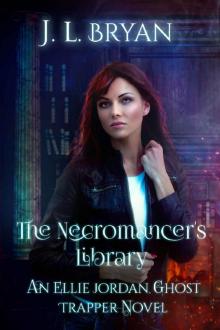 Ghost Trapper 12 The Necromancer's Library
Ghost Trapper 12 The Necromancer's Library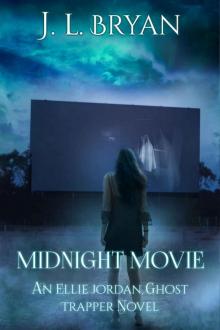 Ghost Trapper 14 Midnight Movie
Ghost Trapper 14 Midnight Movie_preview.jpg) Fairy Metal Thunder (Songs of Magic, Book 1)
Fairy Metal Thunder (Songs of Magic, Book 1)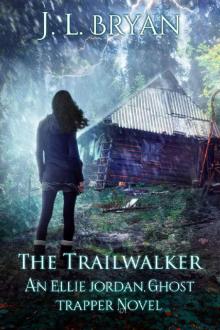 Ghost Trapper 13 The Trailwalker
Ghost Trapper 13 The Trailwalker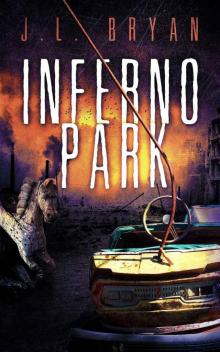 Inferno Park
Inferno Park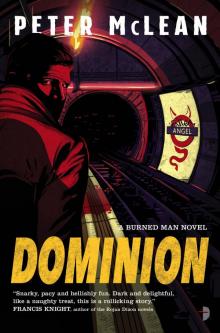 Dominion
Dominion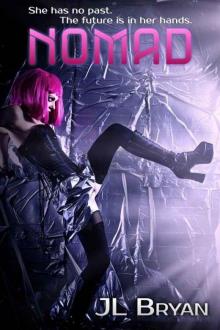 Nomad
Nomad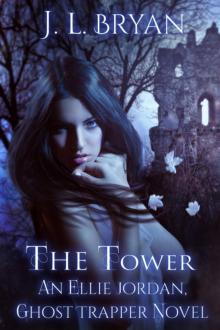 The Tower (Ellie Jordan, Ghost Trapper Book 9)
The Tower (Ellie Jordan, Ghost Trapper Book 9) Jenny Pox (The Paranormals, Book 1)
Jenny Pox (The Paranormals, Book 1)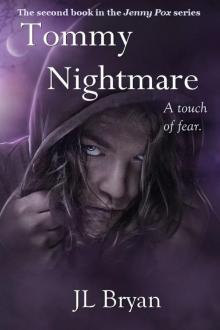 Tommy Nightmare (Jenny Pox #2)
Tommy Nightmare (Jenny Pox #2)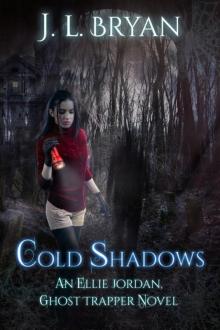 Cold Shadows (Ellie Jordan, Ghost Trapper Book 2)
Cold Shadows (Ellie Jordan, Ghost Trapper Book 2)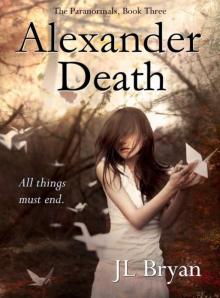 Alexander Death (The Paranormals, Book 3)
Alexander Death (The Paranormals, Book 3)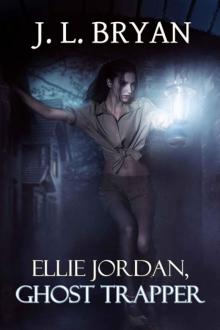 Ellie Jordan, Ghost Trapper
Ellie Jordan, Ghost Trapper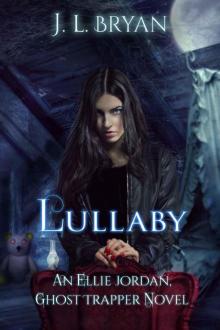 Lullaby (Ellie Jordan, Ghost Trapper Book 7)
Lullaby (Ellie Jordan, Ghost Trapper Book 7)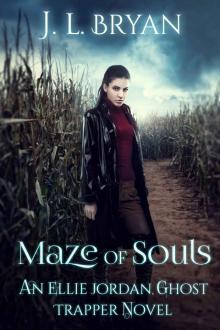 EJ06 - Maze of Souls
EJ06 - Maze of Souls Fairy Metal Thunder (Songs of Magic, #1)
Fairy Metal Thunder (Songs of Magic, #1)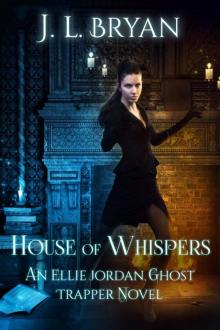 House of Whispers (Ellie Jordan, Ghost Trapper Book 5)
House of Whispers (Ellie Jordan, Ghost Trapper Book 5) Terminal (Ellie Jordan, Ghost Trapper Book 4)
Terminal (Ellie Jordan, Ghost Trapper Book 4) Jenny Pox
Jenny Pox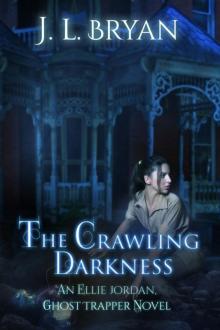 The Crawling Darkness (Ellie Jordan, Ghost Trapper Book 3)
The Crawling Darkness (Ellie Jordan, Ghost Trapper Book 3)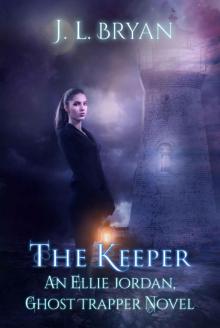 The Keeper (Ellie Jordan, Ghost Trapper Book 8)
The Keeper (Ellie Jordan, Ghost Trapper Book 8)